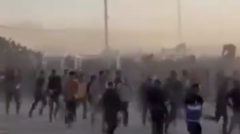A second night of curfew went into effect in downtown Los Angeles as protests against ongoing US immigration raids continue to grow, leading to arrests and extending federal military presence in the city. Over 400 protesters have been detained since unrest began last week, prompting Mayor Karen Bass to act in an effort to maintain order amid accusations that federal actions have instigated public unrest. As the National Guard assists law enforcement, tensions mount between local and federal authorities regarding the handling of the situation.
Curfew Extended in Downtown LA Amid Ongoing Immigration Raids Protests

Curfew Extended in Downtown LA Amid Ongoing Immigration Raids Protests
Los Angeles enforces a curfew for the second consecutive night as tensions escalate from days of protests against immigration actions.
The protests in Los Angeles have entered a second night of curfew, reflecting the escalating unrest sparked by recent US immigration raids in the city. The curfew began at 20:00 local time on Wednesday, following a week of protests which resulted in more than 400 arrests, including a significant number of undocumented migrants. Mayor Karen Bass expressed that the curfew was necessary to halt vandalism and protect public safety, attributing much of the unrest to fears provoked by ongoing federal immigration operations initiated under President Trump's administration.
Bass described the current state of affairs as a national experiment concerning the balance of federal and local powers and called for an end to the immigration raids. Meanwhile, the police reported mass arrests during protests, highlighting incidents of violence that have marred efforts for peaceful demonstrations. The National Guard and Marine Corps deployment, valued at $134 million, aims to support federal immigration personnel, although military leaders maintain that their mission is strictly protective and not offensive toward civilian actions.
As the unrest unfolds, President Trump, facing criticism over his tactics, announced his commitment to restore order. Acknowledging the demonstrations as a threat to public peace, he declared an intent to utilize federal resources to curtail escalations. This confrontation has sparked a broader debate over the militarization of local law enforcement, raising concerns among state officials about the implications for democratic governance. With calls for mass deportations escalating, tensions between supporters and opponents of immigration policies remain high, reflecting the deep divisions present within American society.
Bass described the current state of affairs as a national experiment concerning the balance of federal and local powers and called for an end to the immigration raids. Meanwhile, the police reported mass arrests during protests, highlighting incidents of violence that have marred efforts for peaceful demonstrations. The National Guard and Marine Corps deployment, valued at $134 million, aims to support federal immigration personnel, although military leaders maintain that their mission is strictly protective and not offensive toward civilian actions.
As the unrest unfolds, President Trump, facing criticism over his tactics, announced his commitment to restore order. Acknowledging the demonstrations as a threat to public peace, he declared an intent to utilize federal resources to curtail escalations. This confrontation has sparked a broader debate over the militarization of local law enforcement, raising concerns among state officials about the implications for democratic governance. With calls for mass deportations escalating, tensions between supporters and opponents of immigration policies remain high, reflecting the deep divisions present within American society.




















